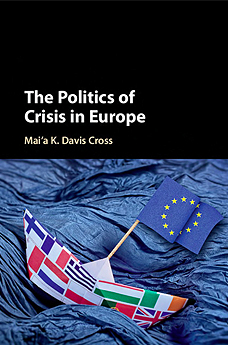[Mai'a K. Davis Cross, The Politics of Crisis in Europe. Cambridge, United Kingdom: Cambridge University Press. 2017. 248 pages]
review / Mª Teresa La Porte [English version].
The main thesis of the extensive research presented in this work is condensed in one of its last conclusions: 'Indeed, what the crisis over Iraq, the constitution, and the Eurozone have revealed is that even in the face of extreme adversity, and even when the easy route of freezing or rolling back integration is on the table before them, Europeans routinely choose more Europe, not less' (p. 235). The author justifies this assertion by arguing that the perception of existential crisis that periodically plagues the European Union is a social construct, initiated and orchestrated by the media and public opinion shapers who control the elaboration of narratives and determine public perception of the facts. Media coverage amplifies a problem that, although undeniable, does not question the existence of the European Union. This negative vision provokes in citizens what Cross calls 'integrational panic', generating a feeling of catastrophe that is multiplied through political discourse. The absence of a 'real crisis' would be demonstrated by the fact that, after these apparent catastrophes, there is a noticeable advance in European integration and a renewed desire to find a consensus.
The book presents an analysis of three recent 'crises' that the European Union has gone through: the dispute over participation in the Iraq war (2003), the discussion over the European Constitution (2005) and the economic crisis in the Eurozone (2010-12). Each of the cases comprises a qualitative and quantitative study of international leading media content, an examination of public opinion reaction and a monitoring of political decision making. Despite the difference between the case studies, the author finds a common patron saint to all of them that allows the comparative study and is developed as follows: emergence of the conflict that provokes the discussion, negative reaction of the social instigators elaborating alarming narratives, perception of existential crisis by the citizenry, state of 'catharsis' (catharsis) in which tensions are relaxed and a serene reflection on the events takes place, and, finally, the resolution phase in which political measures are adopted that reinforce European integration (European Security Strategy, 2003 (European Security Strategy); Lisbon Treaty, 2009 (Lisbon Treaty); European Fiscal Compact, 2012 (Fiscal Compact)).
 |
The European Union is understood as a project in the process of development: 'a work in progress, a project that is perennially in the middle of its evolution, with no clearly defined end goal' (p.2). The disagreements between the member states, in relation to foreign policy or to the Degree integration, are typical of an ambitious initiative, which is in the process of maturing and which is always moving forward with the agreement of each and every one of its members. However, the study does not underestimate the real difficulties faced by the Community institution, which are present throughout research.
Of particular interest is the close monitoring of the social dynamics generated by the interpretation of the 'crisis of existence' of the European Union. The processes of elaboration of narratives by the media, the multiplier effect through the discourses of political actors and experts, and the reaction of European and global public opinion provide a knowledge on the political impact of social behavior that should be further considered in the discipline of International Office. The study devotes special attention to the resolution of the crisis and the phenomenon of 'catharsis' that occurs as a consequence of political reflection. This stage would begin when the options are broadened and different solutions begin to be assessed, the political elites recover their decision-making power and the consideration of potential opportunities to generate consensus and advance integration begins. As the author remarks, catharsis does not eliminate tensions, but it allows an open discussion that concludes with a positive proposal .
The scientific review of the concept of 'crisis' in the main intellectual perspectives of subject is also a positive contribution: the systemic, behavioral and sociological views. Based on the previous production, the author contributes a new concept 'integrational panic' which she defines as 'a social overreaction to a perceived problem'.
The criticism coming from academia, while not failing to underline the interest of approach of work, considers the political analysis of each of the conflicts analyzed to be insufficient and claims that the book does not reflect well the complexity of the problems facing Europe. In particular, she questions whether the Brexit crisis and the rise of Eurosceptic parties do not dismantle the argumentation set out in these pages. The author includes a brief commentary on both issues (the British referendum coincides with the publication of the book) arguing that both problems respond to a national and not a European policy conflict, but the review considers it incomplete.
In any case, the relevance of work is justified for several reasons. Firstly, its novelty: although the crises that the European Union has gone through have been studied before, very few studies have done so in a comparative way and concluded common behaviors. Secondly, and although it is a debatable thesis , the analysis of the effect of the media and public opinion leaders on the existential crisis of the EU contributes to a more accurate and realistic political evaluation of the phenomenon. Finally, the research favors a better management of these periods of turbulence, allowing to reduce the wearing effects of a constant discussion on the survival of the institution inside and outside Europe.